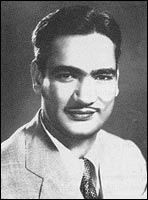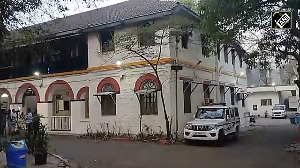Ironically, O P Nayyar is remembered by history as much for what he did not do (record a song with Lata Mangeshkar), as for what he did (compose music for hit films over two decades). 
The stubbornly individualistic Omkar Prasad Nayyar was the only major composer from the golden age of Hindi film music to eschew the siren call of Lata's honeyed vocals. Yet Nayyar's robust songs redolent of his native Punjab (Reshmi salwar kurta jaalidar), his characteristic rhythmic beats (in tanga songs like Yun toh hamne, Maang ke saath tumhara) as well as his feather-light melodies (Jaaiye aap kahan jayenge), were immensely popular.
Nayyar had an obstinate streak right from childhood. Born in Lahore in 1926, he was fascinated by music. He was not trained in music, but left home to pursue a career as a composer. The lanky Nayyar got his first break when he composed the background score for Kaneez
| Famous songs of O P Nayyar | |||
| Song | Film | Singer | |
| Babuji dheere chalna | Aar Paar | Geeta Dutt | |
| Thandi hawa kaali ghata | Mr and Mrs 55 | Geeta Dutt | |
| Yeh hai Bambai meri jaan | CID | Rafi-Geeta | |
| Maang ke saath tumhara | Naya Daur | Rafi-Asha | |
| Yun toh humne | Tumse Nahi Dekha | Rafi | |
| Mera naam chin chin choo | Howrah Bridge | Geeta | |
| Ek pardesi mera dil | Phagun | Rafi-Asha | |
| Bahut shukriya | Ek Musafir Ek Hasina | Rafi-Asha | |
| Humdum mere | Phir Wohi Dil Laya Hoon | Rafi-Asha | |
| Isharon isharon mein | Kashmir Ki Kali | Rafi-Asha | |
| Jaaiye aap kahan jaayenge | Mere Sanam | Asha | |
| Chayen se hamko kabhie | Pran Jaaye Par Vachan Na Jaaye | Asha | |
Three years later, D Pancholi gave Nayyar his debut film, Aasmaan (1952), for which he composed the Geeta Dutt beauty Dekho jaadoo bhare more nain. But Aasmaan, like Nayyar's next two films Chum Chama Cham and Baaz, left the box-office cold.
Baaz made Nayyar's acquaintance with director Guru Dutt, now husband of his favourite singer Geeta. This led to Nayyar being chosen, with a little nudging by Geeta, as music director for Guru Dutt's debut production, Aar Paar (1954). Nayyar conjured a memorable score for this hit film. With Geeta's voice for support, he deftly unfurled a range of silken melodies from the ebullient Ello main haari to the sombre Hoon abhi main jawan.
Nayyar and Guru Dutt productions completed a hat-trick of successes with their next two films, Mr And Mrs 55 (1955) and CID (1956).
He was now in demand. Lata was the reigning playback singer. But Nayyar determinedly avoided recording with her as he felt her voice did not suit his compositions. He zeroed in on fledgling chanteuse Asha Bhosle.
Nayyar had used Asha's voice only sparingly in the early years (Man mora from Mangu) preferring to concentrate on Geeta and Shamshad Begum. But from 1957, he sidelined his erstwhile favourites and lavished his best on Asha.
The famous Nayyar-Asha teaming up proved beneficial to both as Nayyar was lifted to an unprecedented high in 1957- 1958 with around nine releases in both years and a string of successful scores like Naya Daur (for which he won the Best Music Director Award), Tumsa Nahin Dekha, Sone Ki Chidiya, Phagun, Howrah Bridge and Ragini.
Nayyar became one of the earliest music directors to command a lakh for a film.
But his decline was as sudden and as steep as his rise. His arrogance and insistence on a high remuneration were famous. Besides his films in the 1959-1960 phase (Raj Kapoor's Do Ustaad, Dev Anand's Jaali Note) did not set the box-office on fire. In 1961, Nayyar had no releases at all.
An emotional Nayyar always credits S Mukherji with the ability to always inspire him. And it was Mukherji's Joy-Sadhana musical hit, Ek Musafir Ek Haseena (1962) that brought Nayyar back into the reckoning.
It was a different, more relaxed Nayyar in the 1960s who did one film a year and crafted exquisite scores for Phir Wohi Dil Laya Hoon (1963), Kashmir Ki Kali (1964) and Mere Sanam (1965). His limited musical education did not come in the way of embellishing his melodies with well-chosen instruments like the sarangi which he popularised or the piano which ripples through Aapke haseen rukh pe from Baharein Phir Bhi Aayegi.
Guru Dutt and Nayyar reunited for Baharein Phir Bhi Aayegi (1966), but Asha was singing instead of Geeta in a Guru Dutt film. Nayyar's luck had begun to run out when it came to the box-office. Despite composing some truly timeless melodies like Dil ki awaz bhi sun for Joy Mukherji's Humsaaya (1968), the film didn't do well.
In the late 1960s, Nayyar fell out with his favourite Mohammad Rafi but managed to conjure memorable songs even with Mukesh (Chal akela), Mahendra Kapoor (Lakhon hai yahan dilwale) and Kishore Kumar (Tu auron ki kyon ho gayee).
| O P Nayyar's famous solos for Asha Bhosle | ||
| Song | Film | |
| Aaiye meherban | Howrah Bridge | |
| Piya piya na lage mora jiya | Phagun | |
| Ankhon se jo utri hai ke aana |
Phir Wohi Dil Laya Hoon | |
| Beqasi had se jab | Kalpana | |
| Balma khuli hawa mein | Kashmir Ki Kali | |
| Yeh hai reshmi zulphon | Mere Sanam | |
| Yehi woh jagah hai | Yeh Raat Phir Na Aayegi | |
| Zara haule haule chalo | Sawan Ki Ghata | |
| Woh haseen dard de do | Humsaaya | |
| Aao huzoor tumko | Kismet | |
A major blow was Nayyar's split with Asha Bhosle after the pair had reached a crescendo with the Filmfare Award winning Chayen se humko kabhie in Pran Jaaye Par Vachan Na Jaaye (1974). Nayyar tried recreating the magic with new singers but musical trends had bypassed him by then.
In the early 1990s, Nayyar made a surprise comeback with Zid and the Salman Khan-Karisma Kapoor starrer Nischay, unleashing a wave of nostalgia with his unmistakable tunes. Around the same time, new composer Tusshar Bhatia doffed his hat at the veteran by composing in the Nayyar idiom in Andaaz Apna Apna's Elloji sanam hum aa gaye.
Today, the maestro, still dapper in his hat, is seen as a guest on television shows. But OP's beaming visage hides that characteristic stubbornness that has stood him in good stead and helped him tackle the vicissitudes of fate that has seen him move from his posh Churchgate flat to the distant suburbs of Mumbai and necessitated a profession switch from composer to homeopath.






 © 2025
© 2025